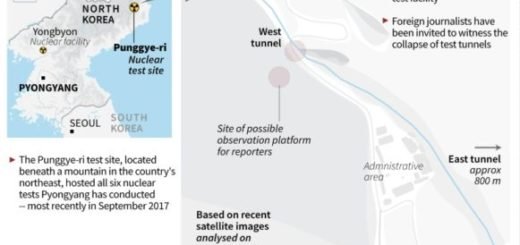Slovenia set for instability after inconclusive election
Slovenia on Monday faced a period of political instability after the party of veteran rightwinger Janez Jansa, who invoked the specter of a migrant invasion on the campaign trail, won snap elections but fell far short of a majority.
With virtually all the votes counted, Jansa’s SDS secured just under 25 percent — giving it 25 seats in the 90-seat assembly — and the “anti-establishment” LMS party of comedian-turned-politician Marjan Sarec came second with 12.7 percent and 13 seats, the State Election Commission said.

AFP / Jure Makovec. Speaking with little triumphalism, Jansa said his Slovenian Democratic Party’s “door for talks and coalitions is open”
The Vecer daily headlined: “Jansa won, what now?”
Columnist Matija Stepisnik said the result left “no one with any real cause for celebration” adding that “the path to Slovenia’s 13th government will be demanding and unpredictable.”
During the campaign, Jansa made common cause with fellow right-wing firebrand Hungarian Prime Minister Viktor Orban, evoking memories of more than 500,000 migrants who crossed Slovenia in late 2015 and early 2016 — even though all but a handful of them continued on to northern Europe.
In a televised statement on Sunday evening, delivered with little triumphalism, the 59-year-old Jansa said his Slovenian Democratic Party’s “door for talks and coalitions is open” to all other parties.
The only party which has so far said it would work with Jansa, the center-right Nova Slovenija, won just 7.1 percent and seven seats, leaving the two parties short of the 46 needed for a majority.
Just under 52 percent of Slovenia’s 1.7 million eligible voters turned out.
‘Red lines’
Once parliament is officially convened later this month, President Borut Pahor is expected to ask Jansa to form a government, but analysts warn negotiations could drag on for months.
Sarec and his second-placed LMS party will now play a crucial role, and on Sunday Sarec reiterated his opposition to Jansa and his anti-immigrant rhetoric.
Speaking to the POP TV station, Sarec said he was “very happy” with the results, hinting that he could band with other parties to keep Jansa out of power.
The center-left Social Democrats finished third on 9.9 percent, followed by the SMC party of outgoing prime minister Miro Cerar on 9.7 percent and the left-wing Levica party with 9.3 percent.
Early elections were called in March after Cerar threw in the towel following months of public-sector strikes and internal wrangling within his coalition.
On Sunday Cerar told POP TV that the “results show that we (SMC) remain an important player on the political stage”.
Fear of migrants
Writing in the Delo daily on Monday, historian Luka Lisjak Gabrijelcic called Jansa an “unlucky winner” and said his history of feuds and confrontation with other political actors will come back to haunt him.
Jansa’s political career stretches back to the country’s struggle for independence from Yugoslavia and has already seen its fair share of drama. In 2013 he was forced to step down from the second term as prime minister over a corruption scandal and ran in the 2014 elections from jail — the conviction was later overturned.
In this campaign, he promised to tackle the thorny issues of healthcare reform and disputes with neighbor Croatia, as well as promising tax cuts.
But it was his combative personality, anti-immigration rhetoric, and alliance with Orban that dominated the closing stages of the campaign.
“Thanks to its (migration) policy, Hungary is a safe country while Belgium, due to its wrong policy, isn’t,” read a recent, typically provocative, Jansa tweet.
Last month Orban said an SDS victory “would ensure the survival of the Slovenian people”.
According to Slovenian media reports, Jansa’s media campaign was also boosted by large investments from Hungarian media companies into a TV station and newspaper co-owned by SDS.
For the first time in over a decade, the elections took place against a backdrop of strong economic growth rather than financial crisis or recession.
But Cerar’s government did not reap any political benefit from the turnaround, with his rivals focusing on growing hospital waiting lists and demands for higher pensions and wages and a better business environment.
AFP
Adriana Murolo The Kootneeti Team - European Watch


















